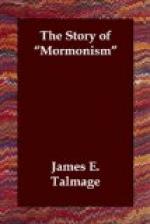Up to 1849, Utah had no political history. Settling in a Mexican province, the contest to determine its future ownership by the United States then in progress, the people in common with most pioneer communities established their own form of government. But in February, 1848, the treaty of Guadeloupe Hidalgo gave California to the United States; months passed, however, before the news of the change reached the west. Early in 1849, a call had been issued to “all the citizens of that portion of Upper California lying to the east of the Sierra Nevada mountains” to meet in convention at Great Salt Lake City; and there a petition was prepared asking of Congress the rights of self-government; and pending action, a temporary regime was established, under the name of the Provisional Government of the State of Deseret.
“Utah” was not the choice of the people as the name of their state; that word served but to recall the degraded tribes who had contested the settlement of the valleys. Deseret, a Book of Mormon name for the honey bee, was more appropriate. The petition of the people was denied in part, and, in 1850 was established the territorial form of government in Utah. Concerning the period of the provisional government, such men as Gunnison, Stansbury, and other federal officials on duty in the west, have recorded their praises of the “Mormon” colonists in official reports. But with the un-American system of territorial government came troubles.
At first, many of the territorial officials were appointed from among the settlers themselves; thus, Brigham Young was the first governor; but strangers, who knew not the people nor their ways, filled with prejudice from the false reports they had heard, came from the east to govern the colonists in the desert. Of the federal appointees thus forced upon the people of Utah, many made for themselves most unenviable records.
Some of them were broken politicians, professional office-seekers, with no desire but to secure the greatest possible gain out of their appointment. With effrontery that would shock the modesty of a savage, the non-"Mormon” party adopted and flagrantly displayed the carpet-bag as the badge of their profession. But not all the officials sent to Utah from afar were of this type; some of them were honorable and upright men, and amongst this class the “Mormon” people reckon a number who, while opposed to their religious tenets, were nevertheless sincere and honest in the opposition they evinced.
In the early part of 1857, the published libels upon the people received many serious additions, the principal of which was promulgated in connection with the resignation of Judge Drummond of the Utah federal court. In his last letter to the United States attorney-general, he declared that his life was no longer safe in Utah, and that he had been compelled to flee from his bench; but the most serious charge of all was that the people had destroyed the records of the court, and that they had resented, with hostile demonstration, his protests; in short, that justice was dethroned in Utah, and that the people were in a state of open rebellion.




